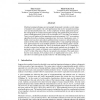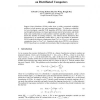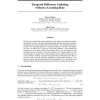NIPS
2007
15 years 2 months ago
2007
We consider apprenticeship learning—learning from expert demonstrations—in the setting of large, complex domains. Past work in apprenticeship learning requires that the expert...
NIPS
2007
15 years 2 months ago
2007
Machine learning techniques are increasingly being used to produce a wide-range of classifiers for complex real-world applications that involve nonuniform testing costs and miscl...
106
Voted
NIPS
2007
15 years 2 months ago
2007
We provide provably privacy-preserving versions of belief propagation, Gibbs sampling, and other local algorithms — distributed multiparty protocols in which each party or verte...
NIPS
2007
15 years 2 months ago
2007
A semi-supervised multitask learning (MTL) framework is presented, in which M parameterized semi-supervised classifiers, each associated with one of M partially labeled data mani...
NIPS
2007
15 years 2 months ago
2007
We present a novel boosting algorithm, called SoftBoost, designed for sets of binary labeled examples that are not necessarily separable by convex combinations of base hypotheses....
80
Voted
NIPS
2007
15 years 2 months ago
2007
Support Vector Machines (SVMs) suffer from a widely recognized scalability problem in both memory use and computational time. To improve scalability, we have developed a parallel ...
48
Voted
NIPS
2007
15 years 2 months ago
2007
104
click to vote
NIPS
2007
15 years 2 months ago
2007
We describe a new algorithm, Relaxed Survey Propagation (RSP), for finding MAP configurations in Markov random fields. We compare its performance with state-of-the-art algorith...
NIPS
2007
15 years 2 months ago
2007
We present a simple, agnostic active learning algorithm that works for any hypothesis class of bounded VC dimension, and any data distribution. Our algorithm extends a scheme of C...
102
Voted
NIPS
2007
15 years 2 months ago
2007
Natural sounds are structured on many time-scales. A typical segment of speech, for example, contains features that span four orders of magnitude: Sentences (∼1 s); phonemes (�...



